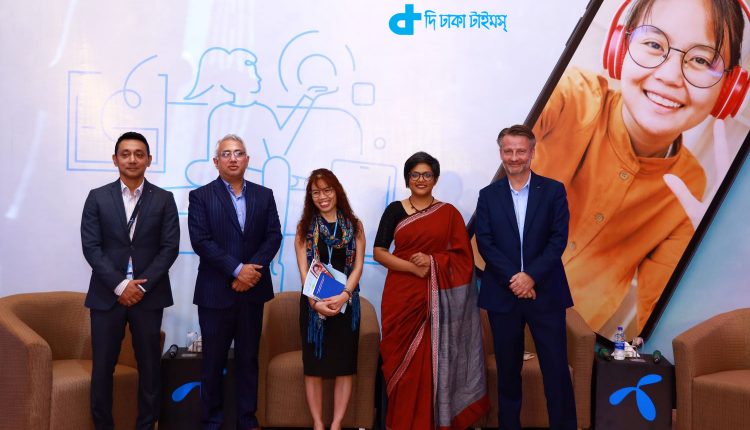The Dhaka Times Desk Telenor Asia recently conducted a survey of 8,000 mobile internet users in 8 Asian countries.

The survey was conducted in Bangladesh, Indonesia, Malaysia, Pakistan, Philippines, Singapore, Thailand and Vietnam in South and Southeast Asia to mark Telenor's 25th anniversary. The results of this survey titled 'Digital Lives Decoded' highlight 5 factors as important influencers in the use of digital technology.
Surveys show that most people want to live an 'always-on' lifestyle. 91 percent of the respondents in Bangladesh feel that their lifestyle has improved by using mobile phones. Overall, women are ahead in this field; Regarding the quality of life in the region particularly improved, 63 percent of women responded positively compared to 52 percent of men. Moreover, 59 percent of women and 50 percent of men think that their quality of life has improved because of mobile phones in Bangladesh.
Grameenphone organized an event at a local hotel on October 18 to announce the results of the survey. Chairman of Grameenphone and head of Telenor Asia Jurgen C. delivered the keynote speech at the event. Arentz Rostrap. In his keynote address, he highlighted how connectivity relates to key trends to ensure greater economic opportunity, everyday convenience and access to essential services for users. A panel discussion was held after the valedictorian speech. where
Grameenphone CEO Yasir Azman, UNDP Bangladesh Deputy Resident Representative Van Nuyen and Child Health Research Foundation Director and Scientist Senjuti Saha discussed the results obtained from the perspective of Bangladesh. Grameenphone Chief Business Officer Dr. Asif Naimur Rashid moderated the panel discussion.
Grameenphone chairman and head of Telenor Asia Jurgen C. Arentz Rostrup said, “In many cases, mobile devices are creating distance between people, distracting them from their surroundings and damaging relationships and communication skills. But this study gives us a different idea. Mobile data usage in Asian countries has more than doubled compared to the pre-pandemic period, forcing us to rethink how we communicate at home. Understanding this gap is important for policy-makers, businesses and individuals alike. This survey highlights where the digital divide lies. The findings of this study will be instrumental in reducing the digital divide.”
Yasir Azman, Chief Executive of Grameenphone said, “Empowerment of the society is the main goal of Grameenphone. Grameenphone has been working relentlessly for 25 years to reduce digital inequality through connectivity. I am very happy that mobile technology is playing an important role in education, healthcare and financial services due to our efforts; Linkage between urban and rural areas has been established. At the same time, we have been able to drive our mission to achieve a poverty-free, knowledge-based and self-reliant economy through a digitally skilled and globally competitive workforce.”
Findings from the study:
1. Life at the touch of a finger - always on!
Almost all respondents said they keep their phone with them for a significant part of the day, with 1 in 5 saying they are never without it. However, about 71 percent of Bangladeshi respondents believe that they maintain a sufficient balance in the use of technology. In Bangladesh, 91 percent of users use their phones at least half of the day, while 20 percent of respondents said they always use their phones.
73 percent of Bangladeshis said that their mobile usage will increase in the next 12-24 months and the country's digital transformation has shown no signs of slowing down in the past two years.
2. Bangladeshis are more concerned about keeping up with the digital lifestyle
Eighty-five percent of respondents in the region are concerned about developing the skills needed to keep pace with technological change. 97 percent of Bangladeshi respondents are apprehensive about this. This concern is even more pronounced among younger respondents—with 68 percent of Gen G respondents and 69 percent of Millennial respondents expressing the greatest concern.
3. (Lack of) trust in the digital realm
There are also concerns about privacy and security of mobile devices across the region (97 percent of Bangladeshi respondents). Baby boomers in Bangladesh have the highest rate (71 percent) of admitting significant improvements in their lives by using mobile phones. They are also most concerned (89 percent) about the privacy and security risks associated with this use. Elsewhere across the region, Gen G and Millennial respondents said they were also concerned about personal information privacy and online security.
4. The growing role of mobile phones in sustainable living
The topic of sustainable living is becoming increasingly prominent in the present era. According to the survey, people are also optimistic about the potential of mobile technology as an aid to more sustainable living. 74 percent of Bangladeshi respondents believe that digital access is very beneficial for leading an eco-friendly life. 69 percent of Bangladeshi respondents believe that saving on paper, waste and electricity and making communication more convenient will bring the greatest benefits (74 percent).
5. Mobile technology is bridging the digital divide
The survey also mentions the greater possibility of mobile usage. Respondents believe that mobile connectivity can play an important role in promoting inclusion. Mobile connectivity makes access to essential services like education (64 percent) and healthcare (55 percent) easier for the common man.
Notably, we also found that more women than men felt that mobile connectivity had improved their employment and earning options.
It has also helped them achieve greater efficiency and productivity in their daily lives. Jorgen C. Arentz Rostrup added, “Mobile connectivity has become more important to our daily lives; However, lack of the right skills and awareness – such as failure to identify security and privacy issues or being disconnected – can limit opportunities for our health, economy and employment.
We need to know what are our deficiencies in the digital sector and how to fill those deficiencies. We also need to know about the carbon footprint of our online activities. Because, we are working together to build a future where mobile connectivity is sustainable and empowering for all.” News bulletins.
Things to do to prevent Corona virus
# try to stay at home all the time.
# Follow the rules and use mask when going out for emergency.
# three-layer cloth mask can be washed if desired.
# wash clothes after coming home from outside. Or hang it without shaking for at least four hours.
# Wash hands thoroughly (for at least 20 seconds) with soap or liquid before coming outside.
# plastic PPE or eyes, face, head must be washed thoroughly with detergent and dried after one use.
# Wear PPE made of cloth or clean as described.
# Use a head cap that completely covers the hair.
# Those who have sneeze cough should follow all the rules promulgated by the government. Also, wash hands as directed before and after handling food items, keys, switches, mice, remote controls, mobiles, watches, computer desks, TVs, etc. and after using the bathroom. Those who have dry hands use Moisture after washing their hands. Soap or hand liquid can be used. Why can this virus remain in the crackle (cracked part) of dry hands? Avoid using highly alkaline soaps or detergents.


